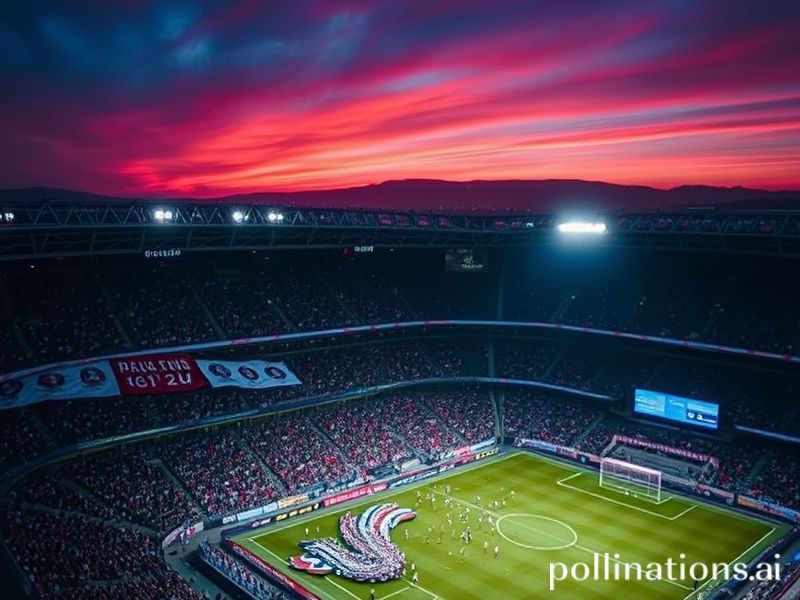The Copa Sudamericana: South America’s Annual Fire Sale Masquerading as a Football Tournament
The Copa Sudamericana lands on our screens each July like a late-night infomercial for existential dread—half-continent talent show, half-arms bazaar for European scouts. From the outside it looks like South America’s plucky little brother to the Champions League, but step closer and you’ll notice the bruises under the foundation: debt-laden clubs selling tomorrow’s stars for today’s electricity bill, ultras trading flares for food, and directors who treat FIFA Financial Fair Play the way a vampire treats garlic-scented cologne.
Globally, the tournament is a neon-lit reminder that football’s center of gravity has not so much shifted as been air-freighted to Madrid, Manchester, and, increasingly, Riyadh. Yet for 47 teams across ten countries, the Sudamericana is still the most reliable export commodity their governments never sanctioned. Win it and you pocket roughly the same prize money Chelsea spends on a single benchwarmer’s loyalty bonus; lose in the Round of 16 and you’re still contractually obliged to pretend the exposure was worth more than the airfare. In macroeconomic terms, it’s a trade imbalance wearing shin pads.
Consider the geopolitical side plot. When Ecuador’s Independiente del Valle lifts the trophy— spoiler alert from 2019 and 2022—their academy becomes a de facto talent mine for richer leagues, a sort of human-capital OPEC. European agents circle like polite vultures, armed with buy-out clauses and promises of “development pathways.” Meanwhile, the kid who scored the winner returns home to find his childhood pitch has been converted into a parking lot for a new mall, because progress smells suspiciously like burnt rubber and overpriced churros.
The viewing public, scattered from Lagos to Lisbon, streams the matches on glitchy platforms that buffer just long enough for you to question your life choices. Algorithms kindly remind you that the same subscription fee could finance three Bolivian defenders for a month, but who’s counting? In the global attention economy, the Sudamericana is niche content for people who like their sport raw, unfiltered, and mildly radioactive. It’s artisanal football: small-batch, ethically dubious, and best consumed before the player you’re admiring is sold to the Saudi Pro League for “undisclosed reasons.”
Administratively, CONMEBOL runs the tournament with the breezy optimism of a flight attendant pointing out emergency exits on a burning plane. Travel schedules resemble abstract art—one week you’re in Asunción, next in Barranquilla, then suddenly Montevideo because someone forgot to bribe the right customs official. Journalists crossing borders clutch negative PCR tests like rosaries, praying that their accreditation outlasts the local internet outage. All of this unfolds under the banner of “continental integration,” which sounds uplifting until you realize it’s mostly integrating debt spreadsheets.
And yet, the thing persists. Each July, new hopefuls emerge: a Peruvian side whose stadium doubles as a llama paddock on weekdays, an Argentine club still trading on faded glory from the days when currency wasn’t a punchline. They play with the manic energy of people who know the world is burning but figure they might as well nutmeg a defender before the smoke reaches midfield. There’s something almost noble in that—like watching a samba band on the Titanic, except the iceberg is named “European Super League.”
So when the final whistle blows in a half-empty arena somewhere equatorial and floodlit, remember that the Copa Sudamericana isn’t just a football tournament. It’s a quarterly earnings report for hope, audited by Nike and wire-transferred through offshore accounts. It’s the global south’s open-mic night, where the jokes are tragic, the punchlines are transfer fees, and the encore is always the same: a teenager hugging a trophy while his agent uploads the highlight reel to YouTube with the caption “DM for offers.”
Cue the fireworks, cue the confetti, cue the inevitable Instagram post captioned “Dreams do come true (terms and conditions apply).” Somewhere in Europe, a sporting director bookmarks the clip under “Winter Bargains.” And the carousel keeps spinning—because nothing says international solidarity quite like selling your brightest star to Wolverhampton.







